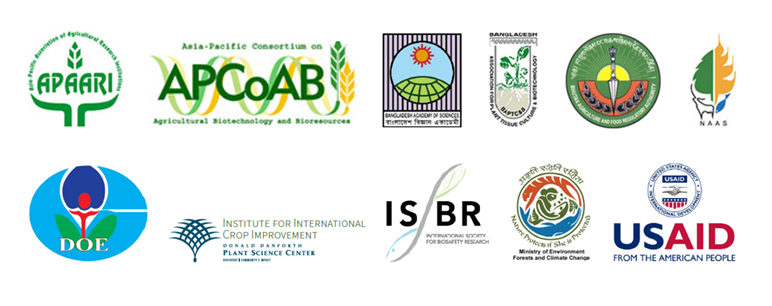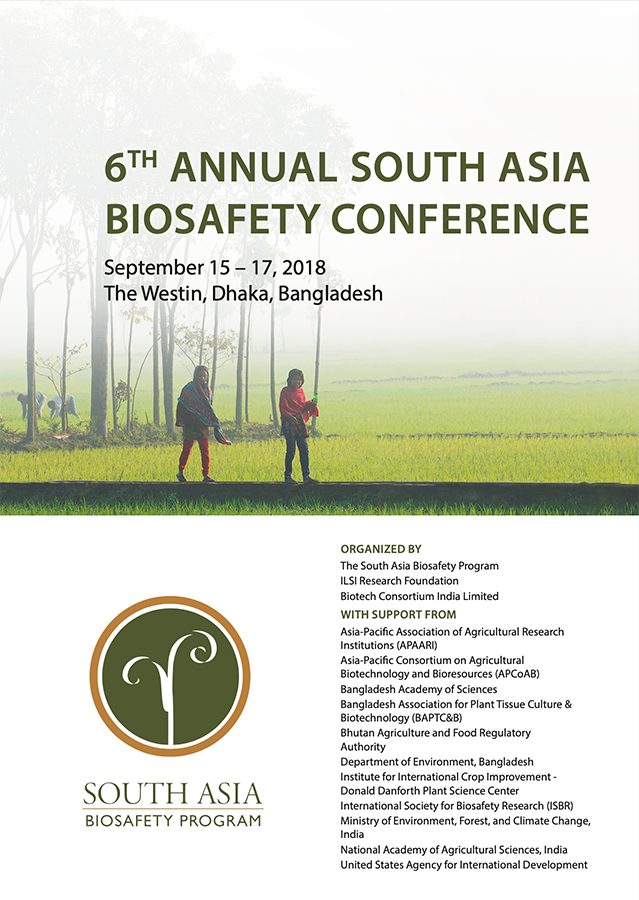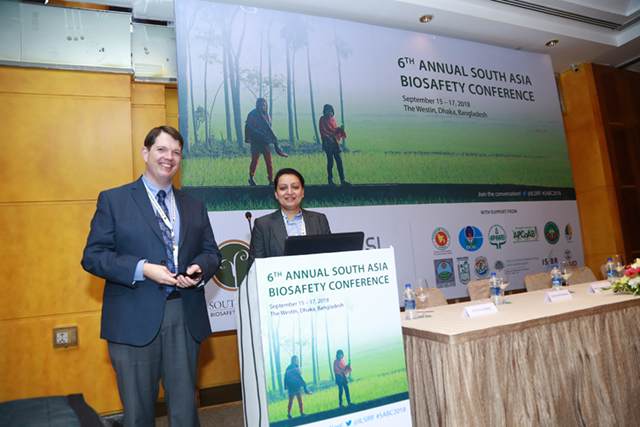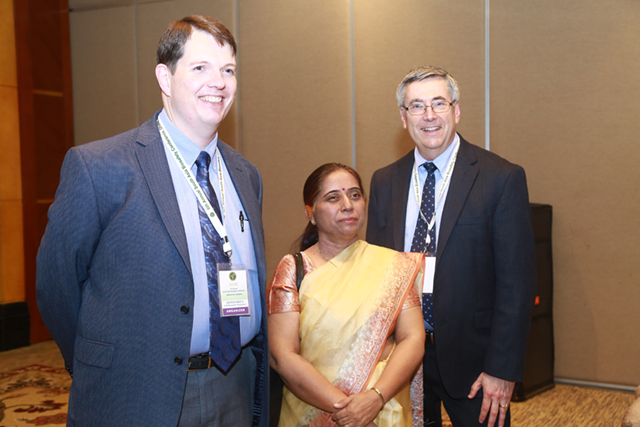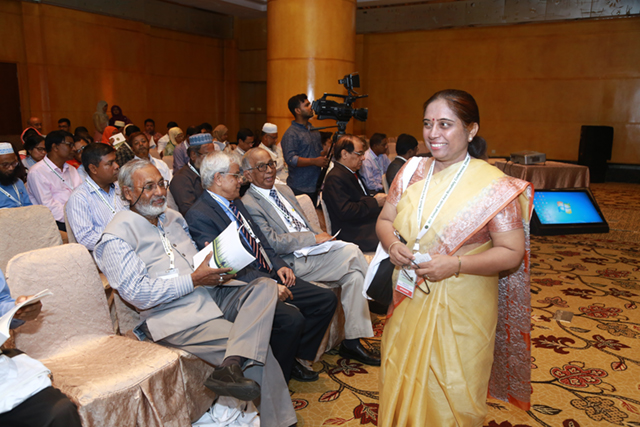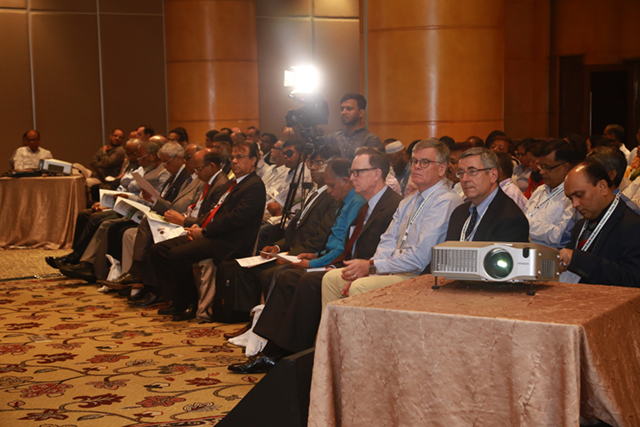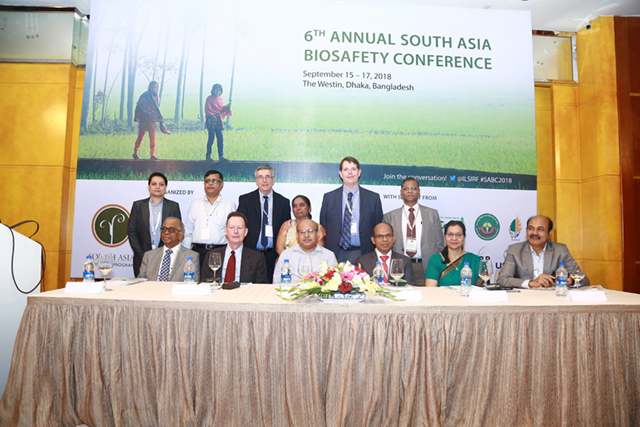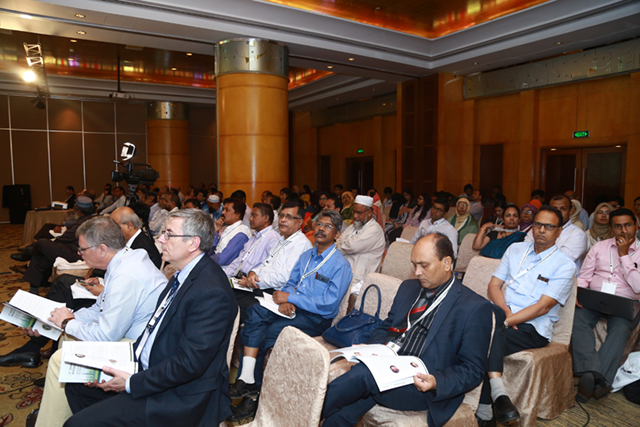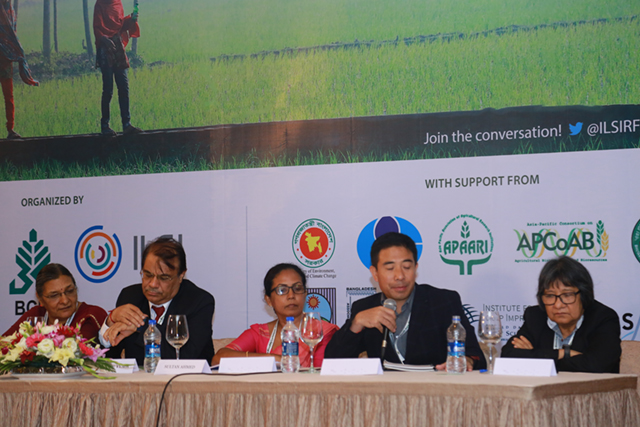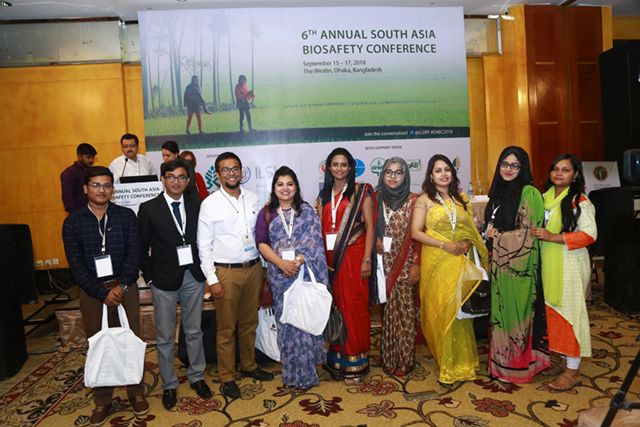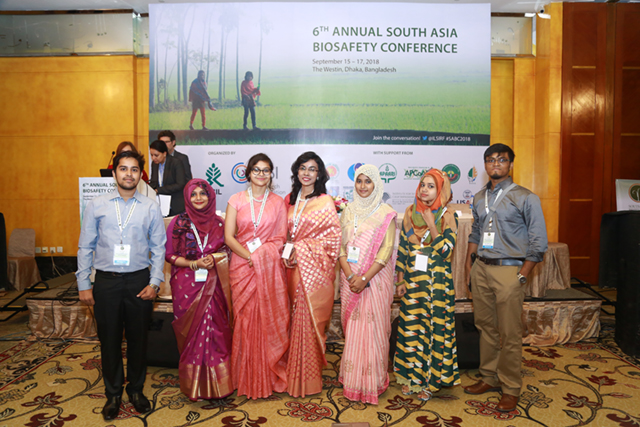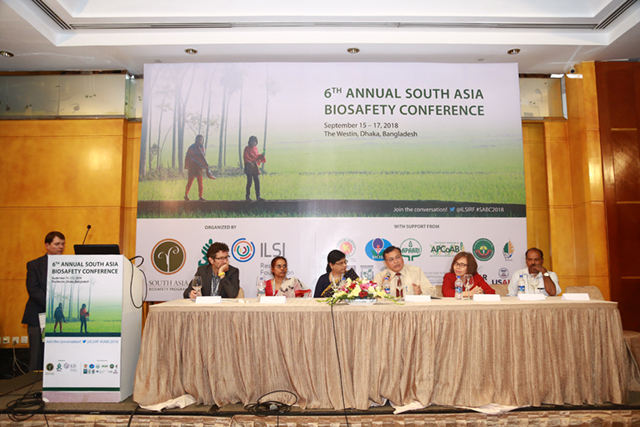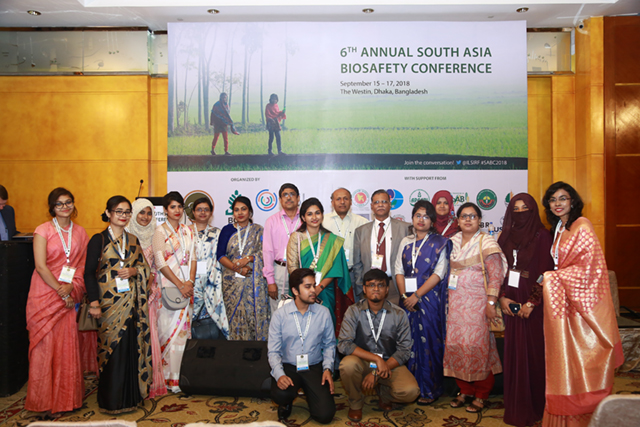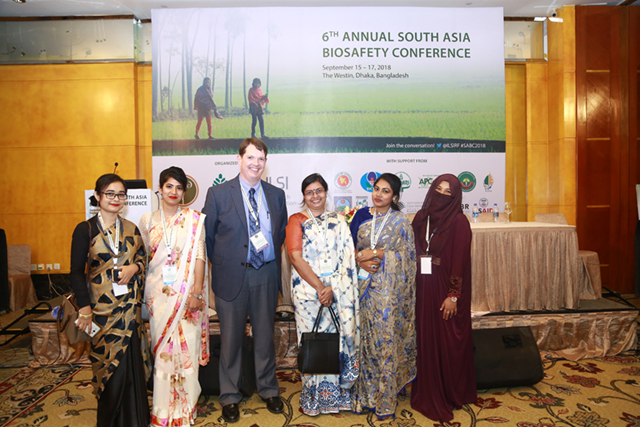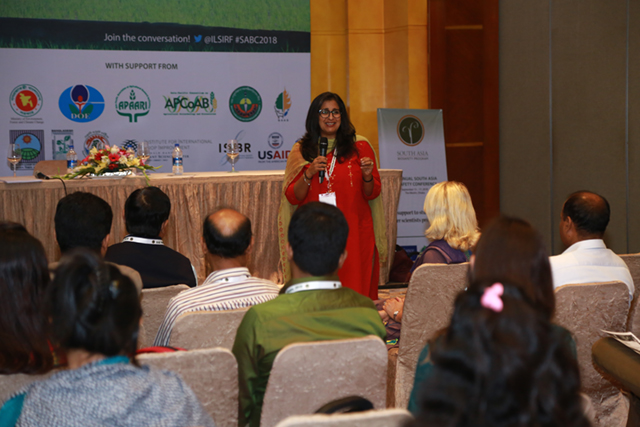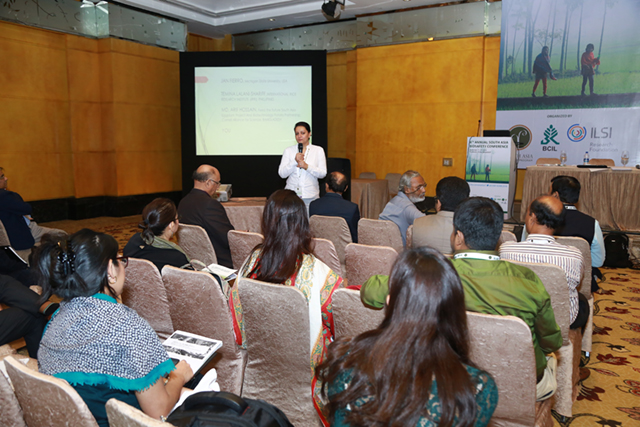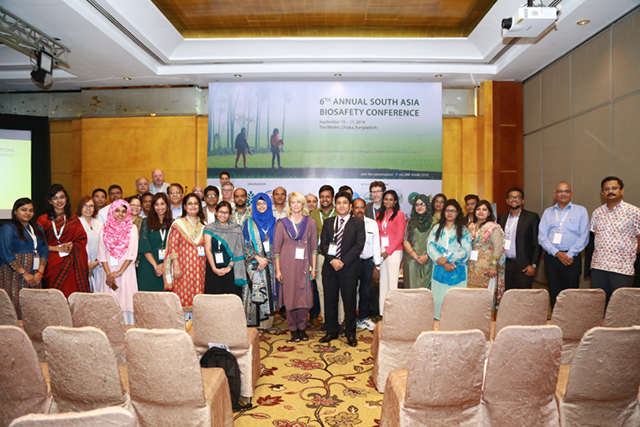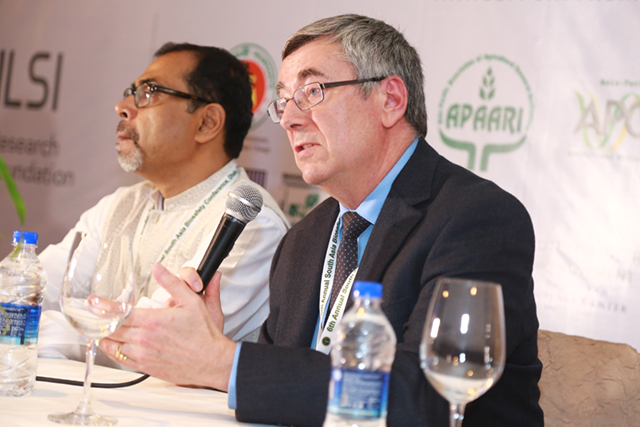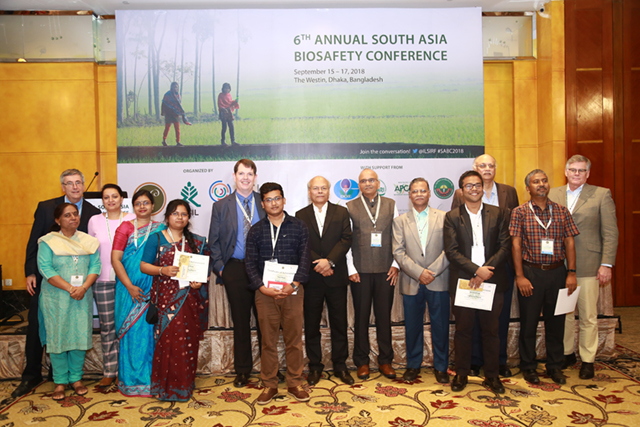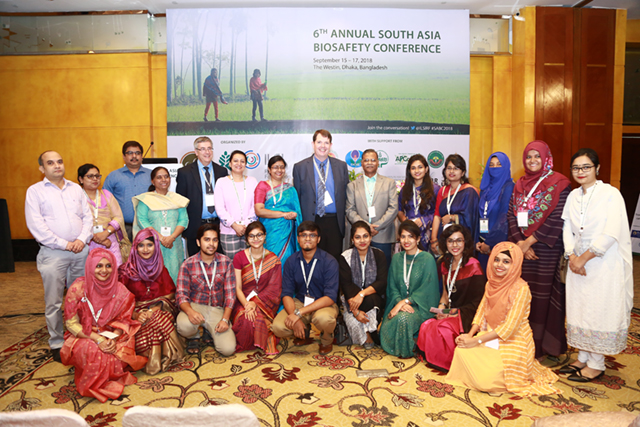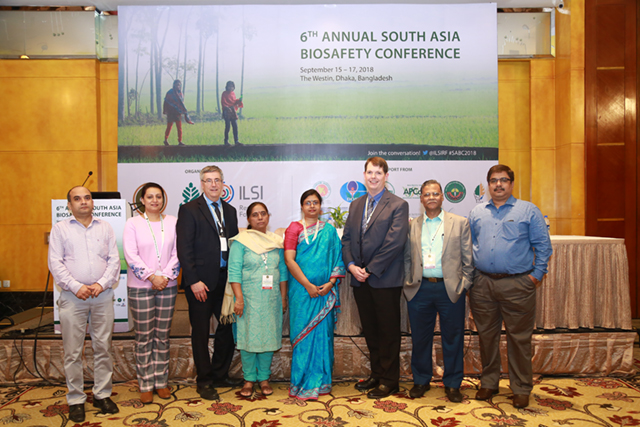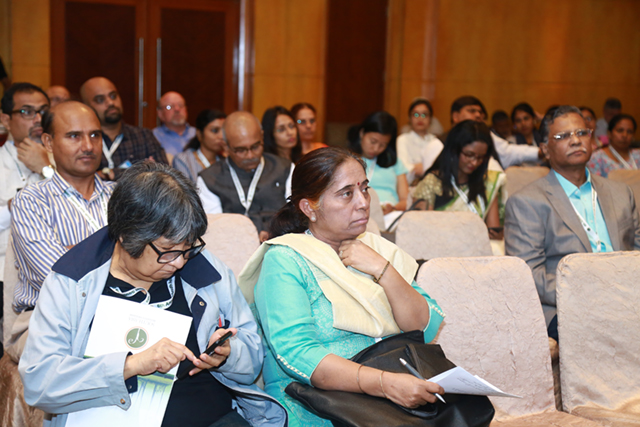6th Annual South Asia Biosafety Conference
-
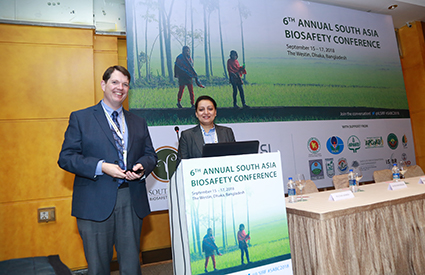
September 15, 2018-September 17, 2018
The Westin
Dhaka, Bangladesh
Under the auspices of the South Asia Biosafety Program, the Agriculture & Food Systems Institute and Biotech Consortium India Limited organized the 6th Annual South Asia Biosafety Conference, which was held on September 15-17, 2018 in Dhaka, Bangladesh. This annual conference is the premier biosafety meeting in South Asia and provides an essential forum to hear from leading scientists representing regulatory agencies, public sector research institutions, and the private sector in South Asia and internationally.
Agenda
Opening Session
Day 1 - September 15, 2018
Delegate Registration
Welcome and Introduction to the South Asia Biosafety Program
Dr. M. Imdadul Hoque, Professor, University of Dhaka, Bangladesh
Regional Harmonization: Contribution by the South Asia Biosafety Program
Dr. Vibha Ahuja, Chief General Manager, Biotech Consortium India Limited, India
Address by Guest of Honor
Mr. David Westerling, Deputy Director, Economic Growth Office, United States Agency for International Development, Bangladesh
Address by Special Guest
Prof. Dr. Quazi Abdul Fattah, President, Bangladesh Academy of Sciences, Bangladesh
Address by Special Guest
Dr. Md. Kabir Ikramul Haque, Executive Chair, Bangladesh Agricultural Research Council (BARC), Bangladesh
Address by Special Guest
Dr. Sujata Arora, Advisor, Ministry of Environment, Forests and Climate Change, India
Address by Chief Guest
Mr. Md. Abdullah Al Mohsin Chowdhury, Secretary, Ministry of Environment, Forest and Climate Change, Bangladesh
Address by Inaugural Ceremony Chair
Dr. Sultan Ahmed, Director General, Department of Environment, Bangladesh
Vote of Thanks
Dr. Bhavneet Bajaj, Scientific Program Manager, Agriculture & Food Systems Institute, USA
Tea Break
Plenary Session I: Biosafety Regulation and Capacity Building Initiatives in South Asia
Day 1 - September 15, 2018
Chair: Dr. Sultan Ahmed, Director General, Department of Environment, Bangladesh
Co-Chair: Dr. Rishi Kumar Tyagi, Coordinator, Asia-Pacific Consortium on Agricultural Biotechnology and Bioresources (APCoAB), Asia-Pacific Association of Agricultural Research Institutions, Thailand
Update on Biosafety Regulation in Bangladesh
Mr. Md. Solaiman Haider, Director (Planning), Department of Environment, Bangladesh
Regulations for Food Derived from Genetically Modified Organisms in India
Dr. Lalitha Gowda, Member, Genetic Engineering Appraisal Committee and Former Chief Scientist, CSIR-Central Food Technology Research Institute, India
Biosafety Regulation and Capacity Building Initiatives in Sri Lanka
Ms. Surani Pathirana, Assistant Director, Biodiversity Secretariat, Ministry of Mahaweli Development and Environment, Sri Lanka
Biosafety Regulation and Capacity Building Initiatives in Bhutan
Mr. Jambay Dorji, Planning Officer/Focal for Biosafety (GMO), Bhutan Agriculture and Food Regulatory Authority, Bhutan
Biodiversity, Biosafety, and You
Dr. Flerida Carino, Professor, Institute of Chemistry, University of Philippines Diliman, Philippines
Lunch
Plenary Session II: Engineering Plant Tolerance to Abiotic and Biotic Stressors
Day 1 - September 15, 2018
Chair: Dr. Zeba Seraj, Professor, University of Dhaka, Bangladesh
Co-Chair: Dr. P.K. Chakrabarty, Assistant Director General (Plant Protection and Biosafety), Indian Council of Agricultural Research, India
Genome Editing for Rice Improvement
Dr. Inez H. Slamet-Loedin, Cluster Lead – Trait and Genome Engineering, International Rice Research Institute (IRRI), Philippines
Bio Prospection of Plant Diversity for Novel Insecticidal Proteins/Genes for Next Generation GM Crops
Dr. P. K. Singh, Principal Scientist and Leader for Insect Defense, Genetics and Plant Molecular Biology Division, CSIR-National Botanical Research Institute, India
Engineering Herbicide Resistance in Rice for Effective Weed Management in Agriculture
Dr. M. K. Reddy, Group Leader, Crop Improvement Group, International Center for Genetic Engineering and Biotechnology (ICGEB), India
Biotechnological Approaches for Engineering Resistance to the Insect Herbivore Helicoverpa armigera in Pigeonpea
Dr. Rohini Sreevathsa, Senior Scientist, ICAR-National Research Center on Plant Biotechnology, India
Engineering Abiotic Stress Tolerance in Monocots and Path To Commercialization
Dr. Jos van Boxtel, Principal Scientist, Arcadia Biosciences, USA
Lightning Round for Students and Early Career Researchers
Day 1 - September 15, 2018
Chair: Dr. Andrew Roberts, Deputy Executive Director, Agriculture & Food Systems Institute, USA
The Lightning Round was a unique opportunity for students and early career researchers to share their research in an oral presentation format that is exciting, challenging, and entertaining. Each participant was given 5 minutes and 5 slides to clearly present their work and were challenged to think carefully about how best to use the allotted time and visual aids. The presentations were scored by the session’s Chair and Co-Chair, and prizes were awarded to the top two participants.
Winners
- First Prize: Sabrina Elias, School of Life Science, Independent University for the presentation: “Blending Gene expression with Phenomics to Decipher Salt Tolerance Determinant”
- Second Prize: Mohammad Umer Sharif Shohan, University of Dhaka, for the presentation: “Two Amino Acid Substitution Model Across Membranes in the Oryza Species HKT1;5 Transporter from Salt Tolerant Rice Landraces for a Beneficially Low Na+/K+ Ratio”
Prizes
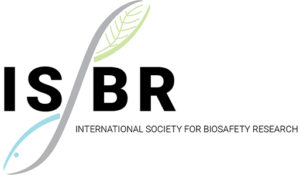
The International Society for Biosafety Research generously provided the following prizes for the SABC 2018 Poster Session:
- First Prize: USD $300
- Second Prize: USD $200
- All participants in the Lightning Round received a one-year membership to the International Society for Biosafety Research.
Lightning Round Presentations
Blending Gene Expression with Phenomics to Decipher Salt Tolerance Determinant
Sabrina M. Elias, University of Dhaka, Bangladesh
Alternatively Spliced Form of the Vacuolar Na+/H+ Antiporter (OsNHX1) Gene: Aspire to Combat Salinity Stress in Rice
Hamida Nooreen Mahmood, University of Dhaka, Bangladesh
Fluorescence Based Kompetitive (Competitive) Allele Specific PCR (KASP) for High-Throughput SNP Marker Detection and Validation
Tabassum Sunfi, University of Dhaka, Bangladesh
Two Amino Acid Substitution Model Across Membranes in the Oryza Species HKT1;5 Transporter from Salt Tolerant Rice Landraces for a Beneficially Low Na+/K+ Ratio
Mohammad Umer Sharif Shohan, University of Dhaka, Bangladesh
Genetic Engineering for Development of Salt-Tolerant Pigeon Pea Plants
Rakshita Singh, CCS Haryana Agricultural University, India
Engineering Insect Resistance in Rice
Yaiphabi Kumam, Tamil Nadu Agricultural University, India
Comparative Nutritional Equivalence Evaluation of Transgenic Chickpea Seeds Harboring either a Cry1Ac or a Cry2Aa Gene
Rubi Gupta, Assam Agricultural University, India
Genetic Engineering of Sugarcane with EXPA1 and BRK Genes Increases Water Deficit Stress Tolerance and its Biosafety Concern
Ashwin Narayan, ICAR-Sugarcane Breeding Institute
Blending Gene Expression with Phenomics to Decipher Salt Tolerance Determinant
Sabrina M. Elias, University of Dhaka, Bangladesh
Alternatively Spliced Form of the Vacuolar Na+/H+ Antiporter (OsNHX1) Gene: Aspire to Combat Salinity Stress in Rice
Hamida Nooreen Mahmood, University of Dhaka, Bangladesh
Fluorescence Based Kompetitive (Competitive) Allele Specific PCR (KASP) for High-Throughput SNP Marker Detection and Validation
Tabassum Sunfi, University of Dhaka, Bangladesh
Two Amino Acid Substitution Model Across Membranes in the Oryza Species HKT1;5 Transporter from Salt Tolerant Rice Landraces for a Beneficially Low Na+/K+ Ratio
Mohammad Umer Sharif Shohan, University of Dhaka, Bangladesh
Genetic Engineering for Development of Salt-Tolerant Pigeon Pea Plants
Rakshita Singh, CCS Haryana Agricultural University, India
Engineering Insect Resistance in Rice
Yaiphabi Kumam, Tamil Nadu Agricultural University, India
Comparative Nutritional Equivalence Evaluation of Transgenic Chickpea Seeds Harboring either a cry1Ac or a cry2Aa Gene
Rubi Gupta, Assam Agricultural University, India
Genetic Engineering of Sugarcane with EXPA1 and BRK Genes Increases Water Deficit Stress Tolerance and its Biosafety Concern
Ashwin Narayan, ICAR-Sugarcane Breeding Institute
Poster Session
Presenting a poster at the South Asia Biosafety Conference was a noteworthy way to share expertise or accomplishment, and poster presenters had a dedicated time to present and discuss their work with the diverse group of attendees. All posters conveyed relevance to biosafety research, environmental or food safety assessment of genetically modified organisms (GMOs), or the regulation of GM plants, animals, arthropods, or micro-organisms.
Poster Competition
All posters accepted into the Poster Program were eligible for the Poster Competition. In cases where a registrant had two or more posters accepted for the Poster Program, s/he were asked to identify which one should be included in the poster competition i.e., only one poster per registrant was eligible for the Poster Competition. The posters were judged on September 15-16 and the winners were announced on September 17 before the final plenary session of the conference.
Winners
- First Prize: Md. Nazrul Islam, National Institute of Biotechnology, Bangladesh, for the poster: “Overexpression of G-Protein Beta Subunit Gene (OsRGB) Confers Both Heat and Salinity Stress in Rice”
- Second Prize: Abdullah Mohammad Shohael, Jahangirnagar University, Bangladesh, for the poster: “Development of Greening (HLB) and Canker Resistant Citrus Cultivars Through Genetic Engineering”
Prizes
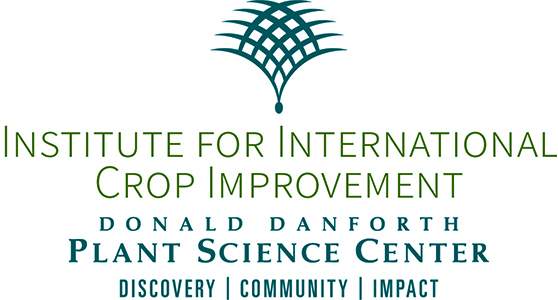
The Institute for International Crop Improvement, Donald Danforth Plant Science Center, generously provided the following prizes for the SABC 2018 Poster Session:
First Prize: Registration, airfare and hotel accommodation to attend the International Society for Biosafety Research Symposium (formerly the International Symposium on the Biosafety of Genetically Modified Organisms or ISBGMO) which will be held April 1-4, 2019 in beautiful Tarragona, Spain.
Second Prize: USD $300 cash and a two-year membership to the International Society for Biosafety Research.
Support for Early Career Scientists
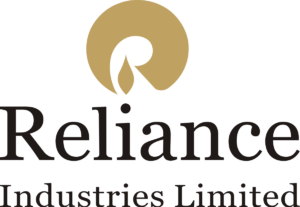
The 6th Annual South Asia Biosafety Conference gratefully acknowledges the generous gift provided by Reliance Industries Limited to support the attendance of three early-career scientists from Indian public sector research institutes so that they could share their work in the Poster Session and Lightning Round.
Evaluation and Judging
Posters were evaluated as follows:
Abstract (10%) – Clarity and correlation with poster.
Scientific Content (70%) – Introduction and background with literature cited, objectives, materials and methods, results and discussion, and significance to field. The quality of the research presented were judged on its scientific rigor and significance as conveyed by the poster. Each poster had to be self-explanatory. Judges had the opportunity to discuss posters with their presenters, but this was not considered in the evaluation of the display.
Poster Display (20%) – Posters were judged on organization, effective use of space, legibility, grammar and spelling, and effective use of graphics.
Each poster display was judged independently by three judges on September 15-16, 2018 based on the abstract, scientific content, and poster display. Judges were encouraged to provide constructive comments for each poster, however comments may have been very brief or absent because of the limited time available. Winners were announced on September 17.
Layout and Design
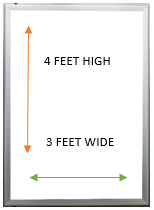 The maximum dimensions for the poster was 48 inches/122 cm (height) x 36 inches/91 cm (width). Poster boards had a plywood surface that permitted the use of removable double-sided tape, tacks, or board pins.
The maximum dimensions for the poster was 48 inches/122 cm (height) x 36 inches/91 cm (width). Poster boards had a plywood surface that permitted the use of removable double-sided tape, tacks, or board pins.
The following were suggestions that contributed to ensuring the readability and quality of posters:
- Check for proper spelling and grammar.
- Use a standard typeface font.
- Ensure text is clear and concise.
- Important information should be readable from about 10 feet away.
- Use bullets, numbering, and headlines make it easy to read.
- Include tables, figures, graphs and color to enforce key points.
- Standard abbreviations may be used without definition, but nonstandard abbreviations/acronyms should be placed in parentheses after the first use of the terminology. It is important to keep nonstandard abbreviations/acronyms to a minimum, to allow for readability and understanding.
- Have a consistent and clean layout.
- Include any appropriate acknowledgments, your name and institutional affiliation.
Assigned Spaces
Each accepted poster was assigned a numbered space for where they would be posted in the conference hall. Posters were added to their assigned space on Saturday, September 15, 2018 prior to the beginning of the Poster Session. Posters remained in their assigned space until Monday, September 17, 2018 after the final plenary session to ensure that attendees and judges had adequate time to view the posters.
Plenary Session III: Research Advances in the Development of Transgenic and Gene Edited Products in South Asia
Day 2 - September 16, 2018
Chair: Dr. Abul Kalam Azad, Director General, Bangladesh Agricultural Research Institute, Bangladesh
Co-Chair: Dr. B. Venkateswarlu, Former Vice-Chancellor, VNM Krishi Vidyapeeth, Parbhani and Member, GEAC, India
Keynote: Opportunities to Address South Asia’s Productivity and Food Security Challenges Using New Breeding Technologies
Dr. Swapan Datta, Professor, University of Calcutta, India
Development of Pro-Vitamin A Rich Biofortified Banana Fruit by Using Transgenic and Genome Editing Approaches
Dr. Siddharth Tiwari, Scientist, National Agri-Food Biotechnology Institute, India
Bt Brinjal: A Genetically Engineered ‘Minor’ Crop Comes of Age in Bangladesh
Dr. Jahangir Hossain, Country Coordinator, Feed the Future South Asia Eggplant Improvement Partnership, Bangladesh
Tea Break
Biotechnological Strategies for Immunity to Aflatoxin Contamination in Groundnut
Dr. Pooja Bhatnagar-Mathur, Theme Leader (Cell, Molecular Biology, and Genetic Engineering), International Crops Research Institute for the Semi-Arid Tropics, India
Status of Bt Cotton Research and Biosafety Measures in Bangladesh
Dr. Md. Kamrul Islam, Program Director – Bt Cotton Research Program, Cotton Development Board, Bangladesh
Research Advances in the Development of Transgenic and Gene Edited Products in South Asia
Dr. Pradeepa Bandaranayake, Director, Agricultural Biotechnology Center, University of Peradeniya, Sri Lanka
International Collaboration, Open Science, and Open Data Sharing to Manage Worrisome Wheat Blast in South Asia by Genomics and Genome Editing Approaches
Dr. Tofazzal Islam, Professor, Department of Biotechnology, Bangabandhu Sheikh Mujibur Rahman Agricultural University, Bangladesh
Advancement of GM Potato Research at BARI for Late Blight Disease Resistant Varieties
Dr. Md. Mosharraf Hossain Molla, Principal Investigator, Bangladesh Agricultural Research Institute, Bangladesh
Lunch
Parallel Workshop
Day 2 - September 16, 2018
Parallel Workshop I: Science Communication – The Importance of Audience Engagement
Parallel Workshop II: Detection of Genetically Modified Crops and Tour of Diagnostic Lab
Parallel Workshop III: Synthetic Biology and Digital Sequence Information under the Convention on Biological Diversity
Plenary Session IV: Animal, Arthropod, and Aquatic Biotechnology - Biosafety Research, Risk Assessment, and Regulation
Day 3 - September 17, 2018
Chair: Dr. Md. Kabir Ikramul Haque, Executive Chairman, Bangladesh Agricultural Research Council, Bangladesh
Keynote: Advancing Animal Biotechnology Innovation in South Asia – Challenges and Opportunities
Dr. Subeer Majumdar, Director, National Institute of Animal Biotechnology, India
Research Progress on Genetically Modified Food and Ornamental Freshwater Fishes with Understandings on Ecological and Health Concerns
Dr. Hirak Kumar Barman, Principal Scientist, Fish Genetics and Bio-Technology Division, Central Institute of Freshwater Aquaculture, India
Approaches for Managing Field Trials of Genetically Engineered Algae
Dr. Tomal Dattaroy, Lead – Regulatory Affairs and Biology, Reliance Industries Limited, India
Genetically Modified Insects Take Flight
Dr. John Teem, Senior Scientific Program Manager, Agriculture & Food Systems Institute, USA
Tea Break
Plenary Session V: The Theory and Practice of Effective Science Communication
Day 3 - September 17, 2018
Chair: Dr. Vibha Ahuja, Chief General Manager, Biotech Consortium India Limited, India
Understanding Effective Communication in Agribiotechnology & Biosafety
Dr. Mahaletchumy Arujanan, Executive Director, Malaysian Biotechnology Information Center, Malaysia
Challenges in Communicating a Biotechnology Product: The Golden Rice Experience
Ms. Temina Lalani-Shariff, Director Communication and Stakeholder Engagement, International Rice Research Institute (IRRI), Philippines
“Science Diplomacy”: A Tool for Connecting Science to the World
Dr. Manoj Kumar Patairiya, Director, CSIR-National Institute of Science Communication and Information Resources, India
Panel Discussion and Q&A
Poster Session and Lightning Round Awards
Lunch
Plenary Session VI: Biosafety Risk Assessment and Regulation of Gene Edited Plants
Day 3 - September 17, 2018
Chair: Dr. B. Sesikeran, Former Director, National Institute of Nutrition, India
Co-Chair: Prof. Zia Uddin Ahmed, Fellow, Bangladesh Academy of Sciences
Keynote: What is Gene Editing? Context for Plant Breeding and Regulation
Dr. Andrew Roberts, Deputy Executive Director, Agriculture & Food Systems Institute, USA
Gene Editing and International Forums: The Convention on Biological Diversity and the Cartagena Protocol on Biosafety
Dr. Karen Hokanson, Research Specialist, Department of Horticultural Sciences, University of Minnesota, USA
Risk Assessment and Regulation of Gene Edited Organisms in Australia
Dr. Heidi Mitchell, Director, Plant Evaluation Section, Office of the Gene Technology Regulator, Australia
Global Regulatory Outlook for Genome Edited Crops
Dr. Valasubramanian Ramaiah, Regulatory and Stewardship Lead, Corteva Agriscience (DowDuPont), India
Gene Editing Applications in Agriculture
Dr. Donald MacKenzie, Executive Director, Institute for International Crop Improvement, Donald Danforth Plant Science Center, USA
Panel Discussion
Tea Break
Closing Remarks, Adjournment, and Tea
Sponsors
SABC 2018 was organized by
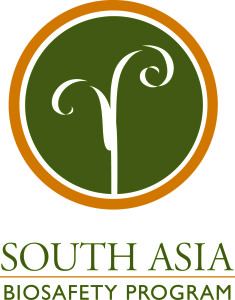

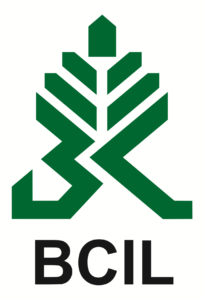
with support from
